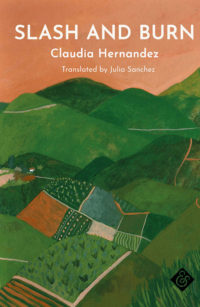Book review: Slash and Burn by Claudia Hernández

August is Women in Translation Month (WITmonth) and so I picked a handful of books from my TBR that meet that description (as well as adding lots more to my to-buy list, thanks to all the great WITmonth reviews and conversations). I decided to start with a novel that I only own because I used to subscribe to the publisher – I cancelled the subscription after a string of their books had failed to move me, but this one almost persuaded me to sign back up (the size of my TBR alone deters me now).
Slash and Burn by El Salvadorian author Claudia Hernández (translated from Spanish by Julia Sanches) is a novel about a woman who fought in and survived the civil war; about the life she built after the war with four of her five daughters; about her efforts to find and reconnect with her lost daughter; about her coming to terms with the world she now lives in and her place within it.
It’s one of those stories that manages to be profound and universal by being specific. Though its main storyline covers only a couple of years it feels epic, taking in her memories of the war and its immediate aftermath but also the perspectives of many other people in her life – mostly women.
“Perhaps it was fate of rings to be lost just as they’d lost the lives they thought they’d have, leaving no memory of the promises they’d made each other. Maybe this was the meaning she’d been seeking for so long and striving not to see. She would have liked a different ending.”
As a guerilla fighting for independence, she felt and still feels a righteousness in her cause that ties her to other former fighters; indeed, she lives in a neighbourhood established for the independence fighters after the peace treaty was signed that was neither a win nor a loss. But over time the area has become more mixed and there is no longer such kudos attached to her status; in fact it is sometimes a burden. She is also treated with suspicion because she keeps so firmly to herself, refusing help from anyone, giving a false impression that she is prospering when she is struggling every day to keep her family fed, clothed and healthy.
These financial pressures worsen when, in the same short space of time, her daughters reach university age and she finds out that her lost child is living in Paris. After two decades of searching, she has to go there, she has to try to reconnect.
The narrative really emphasizes how war reverberates for decades. I was thrown by the fact that all the characters and locations (aside from Paris) are unnamed. It was confusing at times but the translator’s afterword gave a very good and convincing explanation. The characters and places in this novel are far from anonymous – they’re more than a name, they’re identifiable from the various descriptions that build up their identity. Also, the former independence fighters changed their names when they hid in the mountains and many of them changed names again after the war – so names aren’t unique identifiers in this world anyway.
Originally published in 2017 as Roza tumba quema by Laguna Lisbos.
This translation published 2020 by And Other Stories.